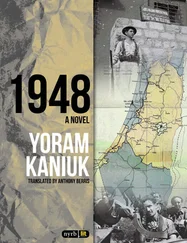Rebecca looked at the old man. His serenity in contrast to Mr. Klomin's yelling became foggy and then his eye was covered with a cold metallic glint. Klomin tried to yell, but he too fell mute at the sight. The two Arabs from Marar bristled where they stood. The old man sank into the ground until he was no longer seen. Later on Mr. Klomin (who then filled his mouth with water) would say: The ground was loose because under the building there was certainly an ancient excavation and he sank into it, maybe it was a graveyard from the period of the kings of Judah, Mr. Klomin would add, during the summer they lived in the coastal plain, maybe it was a center of magnetic heaviness, and Rebecca's hungry look turned to a spear point of the yearnings of two thousand years united in her and she didn't know and sold her grandson to the bosom of foreigners and her ancient blood was then roused to avenge her and foreigners who plot evil against us and the magnetic center turned into an archaeological incident because of the forgotten grave of a Hebrew king. Rebecca laughed, and said: He seeks kings everywhere, simple Jews also lived in this land, Klomin, kings lived in palaces. And Mr. Klomin, sunk in glowing contemplation of the future of the new-old Israeli kingdom, said in embarrassment and longing for the great moments that had all apparently been before he was born and he had already despaired of finding them in his life, that if a person understood the great moment in which he lived, he could experience things beyond time and place.
Rebecca didn't want to hear about the graves of ancient kings. She saw a gentile sinking into the ground. The Arabs were willing to swear to it with a thumbprint. She still remembered Nehemiah's war against the prophets. In her heart she laughed at the poor men who always fight wars that were decided long ago. Boaz remembered the peacock and the old man who disappeared into the ground. Never did he accept his adoption by Rebecca as more than a sufficient reason to torment her or love her as the only person he knew whose loyalty to him he never doubted. She was mine, my mother and my father betrayed me, he said to Noga.
The next day, Boaz had to stand before a big crowd at the community center and tell how the old gentile sank into the yard and disappeared. Some of the founders who limped to the community center shook their heads. Rebecca didn't come. Horowitz's daughter shouted: She always was a witch and always will be… Nehemiah knew that and so he died, she taught Aryeh to play the piano.
Tongues began wagging freely and used what Boaz told. There was no television back then, Noga, Boaz will say later on, and there was still fantasy in the air. She killed the mare of the baron's official, yelled an old woman whose false teeth fell out of her mouth from enthusiasm and her son had to search for them among the feet of the old people that smelled of powder against prickly heat and cow dung. She killed Nehemiah and Dana, she hates us, she lives in the settlement and closes herself up. Germans played for her on the piano during the war when they burned cowsheds of All's Well and Meshulam, her Captain is a spy for the Armenians and Americans and he's a Greek like we're Turks. She injects milk hormones into her cows so they'll win the contests. Her chickens are bewitched and lay eggs nonstop and don't even have time to eat. When the bull sees her he immediately mounts all the cows in the barn. Boaz burst out laughing and the others also felt they were talking nonsense and laughed, in fact nobody was really afraid anymore. Even the exact description of the old man sinking into the dirt wasn't very scary, Rebecca no longer aroused in them more than an enormous need to describe their life as a certain miracle in which she was the leaven. They remembered the Wondrous One and Nehemiah as if they were her lovers. Lately, they were filled with yearnings for Ebenezer. After all, Ebenezer was the first son of the settlement who had changed in their eyes into a mysterious and miraculous tale. As they looked at the birds he left behind they began to be filled with forgiveness for the child they were never able to understand. They didn't forget how he walked in the rainswept street with Dana's body in his arms. His image grew to dimensions it had never had before, and as his death grew more certain, his qualities became more refined. A wood carver turned into a wondrous sculptor. And then it was also decided unanimously to call the community center built by Nehemiah in the name of his dead son and they put a wooden plaque up at the entrance and carved on it: Community Center in Memory of Ebenezer Schneerson Who Knew Wood in Its Distress.
Boaz, who grew up in Rebecca's house, didn't resent the facts of his life, which changed with the years. He succumbed to the essential quality of the settlement, a quality that turned into an incurable disease, to create the past according to the givens of the present and to live in a fictional past as much as possible. His age changed. Later on, when he tried to correct the date of his birth, he couldn't anymore and he remained the age written by the Captain in the document given him by the old man who sank into the dirt, and the Captain's retrospective godfatherhood turned into a fait accompli. Boaz was the only lad in the settlement who had two birth dates, two godfathers (Klomin and the Captain), two mothers, a father in heaven, and three grandfathers: Klomin, Nehemiah, and Joseph Rayna. One of them, and he didn't know which, was also his father or perhaps wasn't, as he used to say afterward. A woman named Rachel Brin who grew shirt trees in America is his aunt, her son Secret Glory also called Lionel Secret is his cousin, the world was created when Secret Charity went down to a cellar and started sallying forth at night and made nineteen children with his stunned wife. There they shouted in cellars, said Rebecca, and not in ridiculous community centers…
Boaz was a taciturn lad. In a small settlement like that one, it's hard to guess the force of hostility and jealousy children feel for somebody who has three grandfathers, a mysterious father, and two mothers who gave birth to imaginary fathers. What the children of the founders didn't know began to be added to what the founders themselves had now forgotten, and their children's children added the rest. Horowitz's son opened an institute for the improvement of seeds that were marketed in many countries. The hothouses they started building were the first of their kind. The produce of the citrus groves, the vineyards, and the fields was good and the yield of the cowsheds was high. The eleven sons of the settlement who fell in the riots of 'twenty-nine and 'thirty-six were joined by heroes who fell in other places and were adopted after their death. Roots, which started as a small handful of graves, turned into a national parade ground hidden by pruned trees from the hot desert winds. Florid speeches were delivered in Roots on memorial days, some of which were invented as needed. Even the death date of the Wondrous One began to be commemorated among most of the nation, children in uniforms carried bouquets of flowers and stood with wooden spears in their hands and swore loyalty to the nation and to the future of the settlement. Choral singing was an integral part of the ceremonies. Throughout the Land of Israel, there wasn't a settlement whose choir sang only in the cemetery. All's Well, principal of the school who was also the husband of the kindergarten teacher Eve, sat in Rebecca's house and tried to learn from her the melody of Nehemiah's speeches from which, he thought, Nehemiah embroidered his "historical" speeches. And she would make up new melodies for him, which he tried unsuccessfully to imitate. Very slowly, he learned the fictional melodies. The Captain, who knew melodies from distant lands, taught him the art of measured grief, the words of the hymn of death, and even the consolations of the old man, who for twenty years was tormented by a damaged heart, succeeded in his premature death, at the age of eighty, to be eulogized as a Pioneer and a hero rich in deeds, who at his death bequeathed us life.
Читать дальше












